Promotion of Diversity
The Tsubaki Group has undertaken systemic reforms, for example, our employee management system, which is based on our longstanding job-centered emphasis on the division of roles and results, and with a focus on expanding diversity, by extending the retirement age to 65 and establishing a special subsidiary. The newly introduced systems and mechanisms are continuously improved as they are implemented, enhancing their effectiveness.
Since FY 2018, Tsubakimoto Chain has been moving ahead with work style reforms. To offer more efficient and flexible work styles, we have introduced various measures including flexible working hours, a discretionary labor system, and a work-at-home system, and the Labor/Management Joint Committee is cooperating to reduce excessively long work hours and promote the utilization of paid vacation time. In addition, we are implementing the Tsubaki Style initiative to eliminate the use of official titles in spoken and written communication, and promoting a smart-casual dress code at workplaces other than plants, with the goal of creating a lively workplace culture.
We will continue to implement measures to create workplace environments where people of all nationalities, gender identities, and ages can enthusiastically work with the confidence that they will be evaluated fairly.
-
Composition of Employees by Region
(as of March 31, 2024)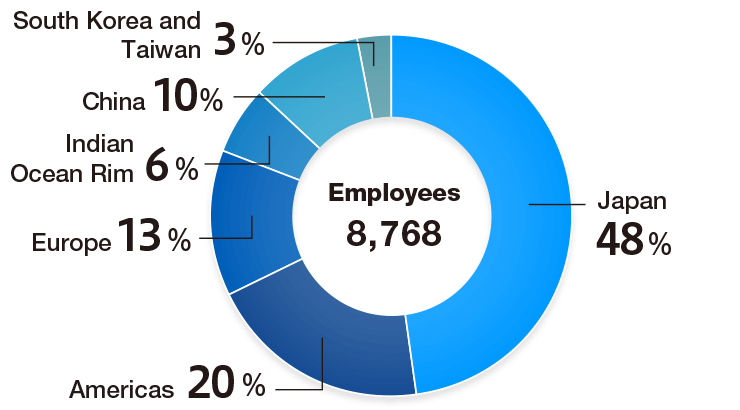
-
Ratio of Paid Leave Acquisition
(Tsubakimoto Chain, Non-Consolidated)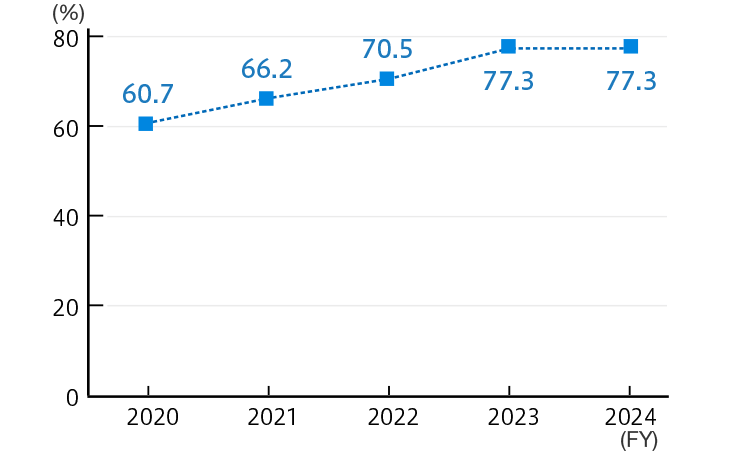
Initiatives
(1) Active Participation of Women
At Tsubakimoto Chain, we have been pioneers compared with our competitors in introducing equal wages for men and women, and we have implemented a employee management system that allows female employees to comfortably continue working during life events such as pregnancy and childbirth. We are aiming to further increase the percentage of women in the company (10.0% as of April 1, 2025) by actively encouraging applications from various high schools and universities. We are simultaneously enabling women to deepen their understanding of our work environment through efforts such as women introducing their jobs at explanatory meetings. At the company, we are dispatching employees to external seminars about women’s advancement, and promoting the advancement of women by proactively providing opportunities for promotion to outstanding employees, regardless of gender.
Ratio of Female Senior Roles /
Number of Female Employees in Senior Roles
(Domestic)
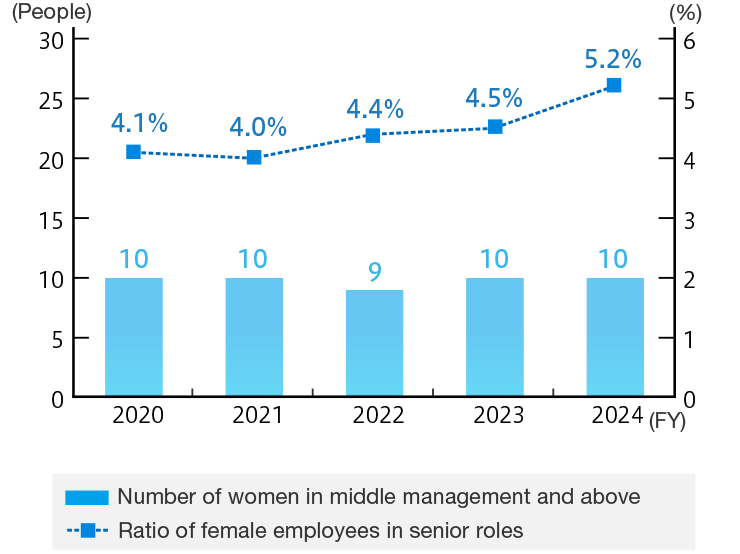
(2) Support for Balancing Work with Childcare
We are also providing active support for balancing work with childcare. We are creating an environment that makes it easier for both men and women to take childcare leave by raising awareness of the childcare leave system within the company and educating management-level employees. We have also reestablished a work-at-home system to enable flexible workstyles for employees who are raising children below three years of age or caring for sick, disabled, or elderly relatives.
As a result, the rate of return to work after taking maternity/childcare leave in FY 2024 was 92.5%, and 34 male employees took childcare leave, with the leave acquisition rate at 45.9%, a 4.3 point increase year-on-year.
We are also focusing on initiatives to raise awareness of systems in a way that is easy for employees to understand, for example, by revising the Maternity and Childcare Leave Handbook and publishing the Handbook for Balancing Work with Caregiving.
Number of Employees Who Acquired Childcare Leave (Tsubakimoto Chain, Non-Consolidated)
| FY 2020 | FY 2021 | FY 2022 | FY 2023 | FY 2024 | |
|---|---|---|---|---|---|
| Women | 5 | 1 | 3 | 8 | 6 |
| Men | 4 | 5 | 29 | 37 | 34 |
(3) Promotion of Employment Opportunities for People with Disabilities
The Tsubaki Group is striving to expand work duties available for people with disabilities and create an environment where they can work together with other employees.
In 2020 we established a special subsidiary to promote the employment of people with disabilities, and we have been strengthening the support systems and actively expanding employment opportunities for them. We are working to provide people with disabilities a wide range of work roles. Additionally, as one part of our working support measures, we have been creating a comfortable workplace environment, including setting up a special yard area for people with disabilities (Saitama Plant), and expanding and improving special subsidiary offices (Kyotanabe Plant).
As a result, we have achieved employment levels that exceed the legally required employment ratio every year since FY 2020. However, this level is not our final goal, and we will also create working environments that are comfortable for everyone from the perspective of universal design. We regard the employment of people with disabilities as central to our diversity efforts, and we are linking this to the revitalization of the organization and to fostering innovation.
These initiatives have been positively evaluated, and in FY 2024, we received the Kyoto Prefecture Governor’s Award for Excellent Employment of People with Disabilities.
Kyoto Prefecture Governor’s Award for Excellent Employment of People with Disabilities
-
Ratio of Employees with Disabilities
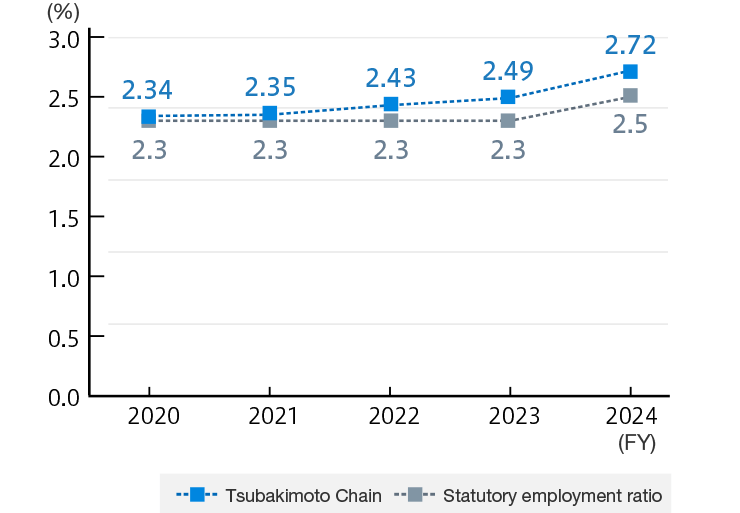
An Outline of Our Special Subsidiary (Tsubaki Support Center Co.)
Tsubaki Support Center is a Tsubakimoto Chain subsidiary established primarily to handle welfare and outsourced operations. In FY 2020, it was certified as a special subsidiary of Tsubakimoto Chain, and began offering business services staffed by persons with disabilities. The company provides a comfortable working environment and jobs that allow each individual to play an active role according to their abilities and talents. It also has a support system in place that allows each employee to demonstrate his or her abilities. (It currently employs eight disability vocational counselors and eight lifestyle counselors.)
Their current duties include manufacturing, printing, data entry, scanning, and cleaning. To expand employment, we are actively accepting internships and work observation tours from special needs schools and other organizations. In FY 2024, the Kyotanabe and Saitama Plants accepted a total of 31 interns and more than 90 people on work observation tours. In the future, we intend to expand into the services sector. By proactively employing people with disabilities, we are fulfilling our responsibility to society.
Our initiatives have been recognized, and in 2022 we received the Kyoto Prefecture Governor’s Award for Excellent Employment of People with Disabilities, and we were certified as a Company Promoting the Employment of People with Disabilities in Kyoto Prefecture (Kyoto Heartful Company).
-
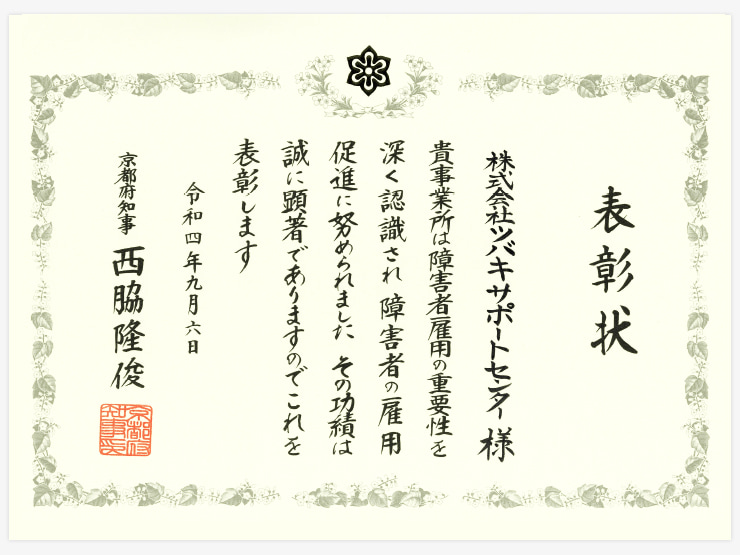
Kyoto Prefecture Governor’s Award -
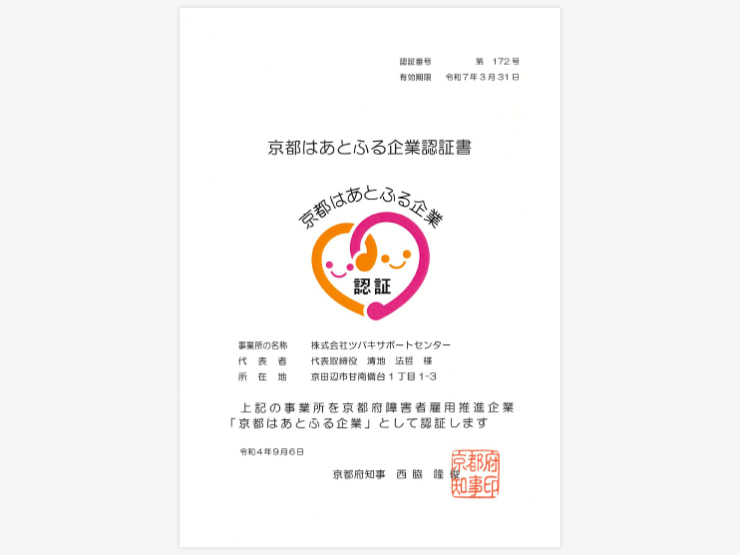
Certified as a Kyoto Heartful Company
Besides this, we also participate in the Neurodiversity Kyoto Community Cooperation Project (ND Kyoto), which is a study and exchange project operated by a group of Kyoto companies that aims to promote the employment of people with disabilities.
(4) Active Participation of Seniors (under the Japan Law)
At Tsubakimoto Chain, in April 2020, we introduced an Age-65 Retirement System, that extends the retirement age from 60 to 65 years old. With the introduction of a new retirement age of 65, we have also improved our treatment of older employees. As a result, we have maintained a high rate of continuous employment of 90% or more since the introduction of the system. We also enhanced our career training program for employees at the age of 50. The content of training has been revised to encourage people to maintain their desire to work and to continue learning until age 65, and we also provide support by raising awareness of the opportunities available.
(5) Expanding the Employment of Non-Japanese
We have been striving to expand the employment of non-Japanese employees to introduce diverse ways of thinking that stimulate innovation and business growth. Our target for FY 2030 is to employ 85 non-Japanese (there were 33 non-Japanese employees at the company and one Executive Officer as of March 31, 2025). We employed three mid-career non-Japanese employees in FY 2024. 14 employees have more than ten years of service and are active in a wide variety of areas, including Headquarters Operations, technology, procurement, and the CS Promotion Department.
The global operations of our company are introduced to students at corporate internship briefings, and as well as accepting many non-Japanese interns, we are actively accepting interns from universities outside Japan.
Number of Non-Japanese Employees
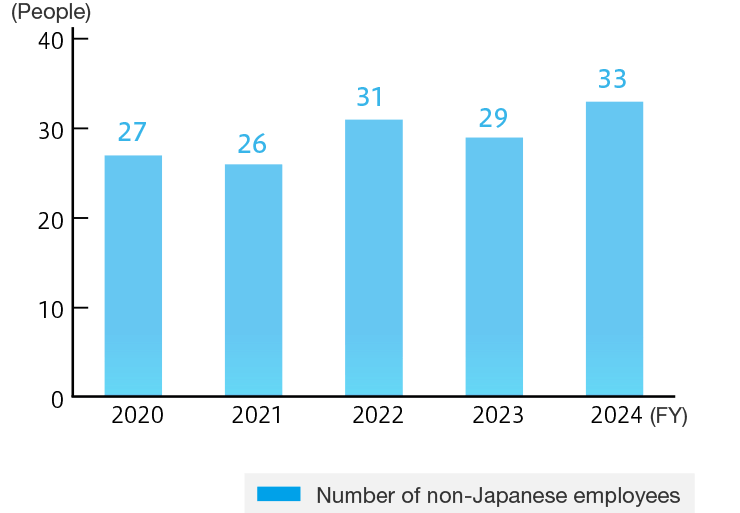
Topics
Holding Disability Equality Training (DET)
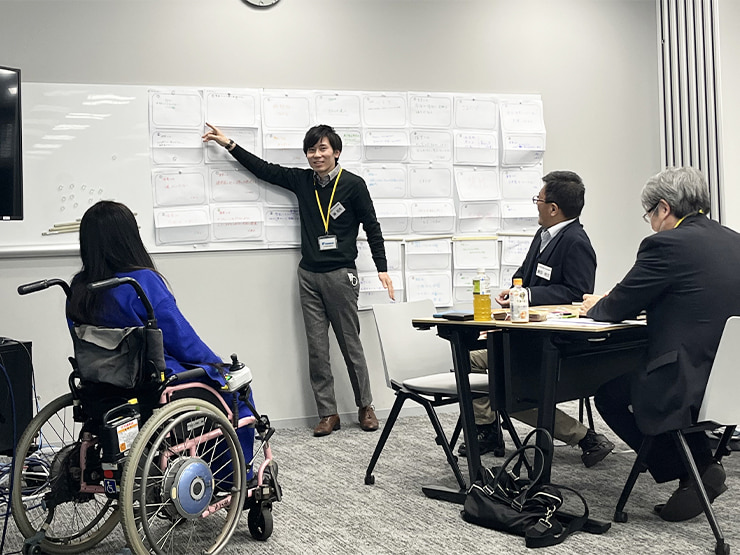
At Tsubakimoto Chain, a lecturer was invited from the NPO Disability Equality Training Forum to host disability equality training (DET). For this training, people with disabilities acted as facilitators, and along with the other participants considered the creation of inclusive organizations from which people with disabilities are not excluded.
Through the use of a video featuring examples in which the lifestyle perspectives of social majorities and minorities were reversed, participants also learned how those who are part of a minority are viewed in society and what kinds of difficulties they experience. At the same time as realizing the sense in which “disability” is not about people with disabilities themselves but the fact that the environment and society that surrounds them creates “disability,” participants were able to acquire specific actionable objectives for achieving disability equality.
Regardless of whether or not someone has a disability, the Tsubaki Group promotes the creation of workplaces in which all employees can demonstrate their abilities to the full, with the aim of being a company where everyone feels comfortable working. As such, this training provided a meaningful opportunity for participants to confront the issue of diversity and consider specific behaviors.
Providing an Internship at a Subsidiary in Thailand
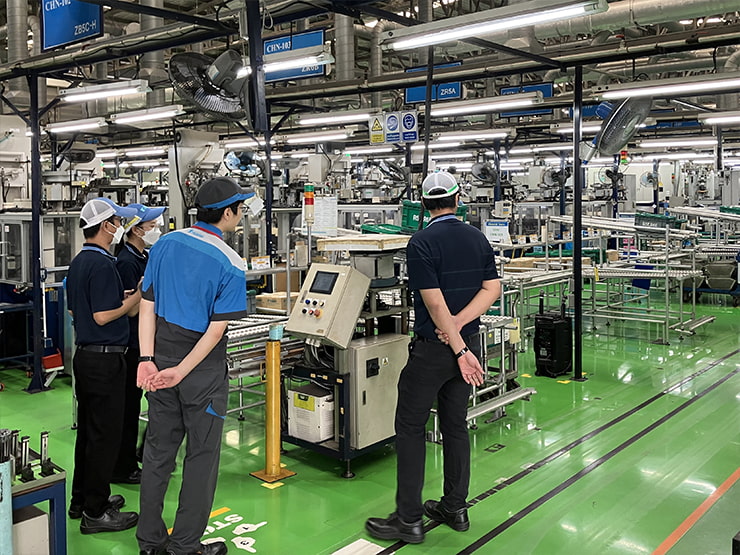
In September 2024, a student from the Faculty of Science and Engineering at Doshisha University was accepted on an internship at a subsidiary in Thailand that manufactures automotive parts.
This was part of the Safe and Secure Advanced Technician Development Program, which is planned by the university in collaboration with companies, and involves working on safety-related issues in the manufacturing industry such as design, development, production, and facilities installation, with the aim of improving technicians’ skills. The five-day internship included classroom learning—for example, regarding health and safety activities and safety management—and in response to requests from the student, facilities risk assessment and on-site practical training, with the student benefitting from a wide range of experiences.
A debriefing session on the final day included a presentation about suggestions for improvements to safety in the production process, and the internship was also a valuable opportunity for local staff members to interact with someone from a different cultural background.
Toward a Sustainable Society
The Tsubaki Group is engaged in the “art of moving” and aims to provide value that exceeds expectations
to become a company that continues to be needed by society.


